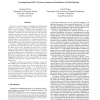Free Online Productivity Tools
i2Speak
i2Symbol
i2OCR
iTex2Img
iWeb2Print
iWeb2Shot
i2Type
iPdf2Split
iPdf2Merge
i2Bopomofo
i2Arabic
i2Style
i2Image
i2PDF
iLatex2Rtf
Sci2ools
ISCA
2006
IEEE
2006
IEEE
Learning-Based SMT Processor Resource Distribution via Hill-Climbing
The key to high performance in Simultaneous Multithreaded (SMT) processors lies in optimizing the distribution of shared resources to active threads. Existing resource distribution techniques optimize performance only indirectly. They infer potential performance bottlenecks by observing indicators, like instruction occupancy or cache miss counts, and take actions to try to alleviate them. While the corrective actions are designed to improve performance, their actual performance impact is not known since end performance is never monitored. Consequently, potential performance gains are lost whenever the corrective actions do not effectively address the actual bottlenecks occurring in the pipeline. We propose a different approach to SMT resource distribution that optimizes end performance directly. Our approach observes the impact that resource distribution decisions have on performance at runtime, and feeds this information back to the resource distribution mechanisms to improve future ...
| Added | 12 Jun 2010 |
| Updated | 12 Jun 2010 |
| Type | Conference |
| Year | 2006 |
| Where | ISCA |
| Authors | Seungryul Choi, Donald Yeung |
Comments (0)

